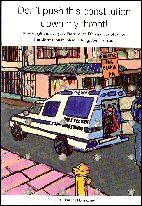
"Don't push this constitution down my throat!" Human rights in everyday practice. An ethnography of police transformation in Johannesburg, South Africa / Julia Christine Hornberger - [S.l.] : [s.n.], 2007 - Doctoral thesis Utrecht University

 |
"Don't push this constitution down my throat!" Human rights in everyday practice. An ethnography of police transformation in Johannesburg, South Africa "Don't push this constitution down my throat!" Human rights in everyday practice. An ethnography of police transformation in Johannesburg, South Africa / Julia Christine Hornberger - [S.l.] : [s.n.], 2007 - Doctoral thesis Utrecht University |
The democratic changes taking place in South Africa in 1994 merged providentially with international human rights concerns. One could even argue that South Africa epitomised the post cold war to 9/11 period in which former authoritarian regimes turned willingly towards a democratic and market oriented, liberal democracy. In this new tide of respect for human rights, and as actually embodying the evil of the past, the South African Police was faced with the explicit demand to take on and put into practice the principles of human rights based policing. In line with the overall Zeitgeist, human rights were seen as key to bringing about post-apartheid legitimacy for state institutions. It compelled some far reaching administrative and institutional changes. How then did human rights translate into local police practice, and specifically into the daily practice of detectives at two police stations in Johannesburg? This thesis is an exploration of this question. The translation of human rights into daily practice was, as this thesis shows, is far from straightforward. At the interface between police, the law and people a spectrum of human rights vernaculars emerged. These vernaculars gave new meaning to human rights. They revealed that the dominant legalistic language and practice of human rights, which claims universality and non-particularity, is highly specific and exclusive. This, instead of blaming it on their unwillingness, explains why police officer fail to do justice to human rights policing. These vernaculars also made police practice workable and the state legible to those directly affected. Through this, new social manoeuvres and new practices of local justice were produced. For example these vernaculars recovered for the police officers a position from which to use their own moral discretion which human rights as juridical technical procedure deprive them of. Further it allows the population to appropriate state power and redirect into the realm of informality where as heavy handed persuasion and tangible punishment it serves forms of local justice. In this thesis I show that all these social manoeuvres become visible if one puts on analytical par the hyper-reality of human rights (and its policy consensus) with the tactical and tacit practices of everyday life both of people and police. It allows us to see how the contemporaneous present takes shape beyond a suffocating exclusive dichotomy which posits an either/or choice between the realisation of a teleological normative future or the continuation of the past. I conclude that human rights do not necessarily produce legitimacy, nor are they in total opposition to state violence, and in fact they often become the means through which state violence is reproduced, appropriated and re-directed. keywords: policing, violence, Africa, South Africa, Johannesburg, transforming societies, human rights, law |